A reader asked me a translation question about the final battle in The Legend of Zelda: Breath of the Wild. As he explains, there’s been some buzz about the final battle having a translation error or translation change in English:
The English script contains the following line: “He has given up on reincarnation and assumed his pure, enraged form.” The implication in that seems to be that Ganon assumes this bestial form by gathering all of his power and rage at once, doing so at the cost of his ability to reincarnate. Pretty straightforward, right? Apparently not.
I’ve seen it mentioned that the Japanese counterpart to this line is quite different, even outright contradictory. Supposedly, the implication in that line is more along the lines of his undying desire to reincarnate fueling his rage to such a degree as to create the beast form we see. In other words, it’s his REFUSAL to give up on reincarnation that does it; almost the exact opposite implication as the English line!
So, what’s the verdict, good sir?
First, if you’re curious to see both versions of this scene, the English scene begins about 10 seconds into this video, and the Japanese scene begins at 8:27 into this video.
Before the Battle
The particular line of interest is this one:
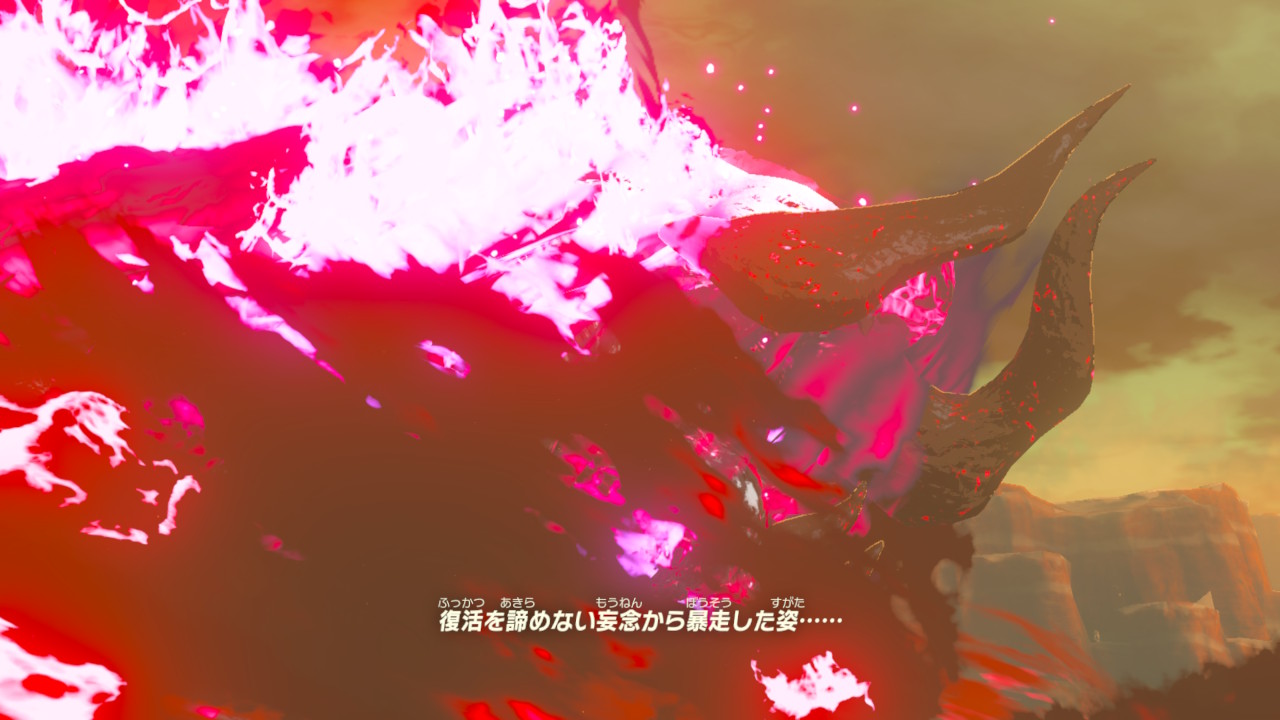 |
| Japanese release (Switch) |
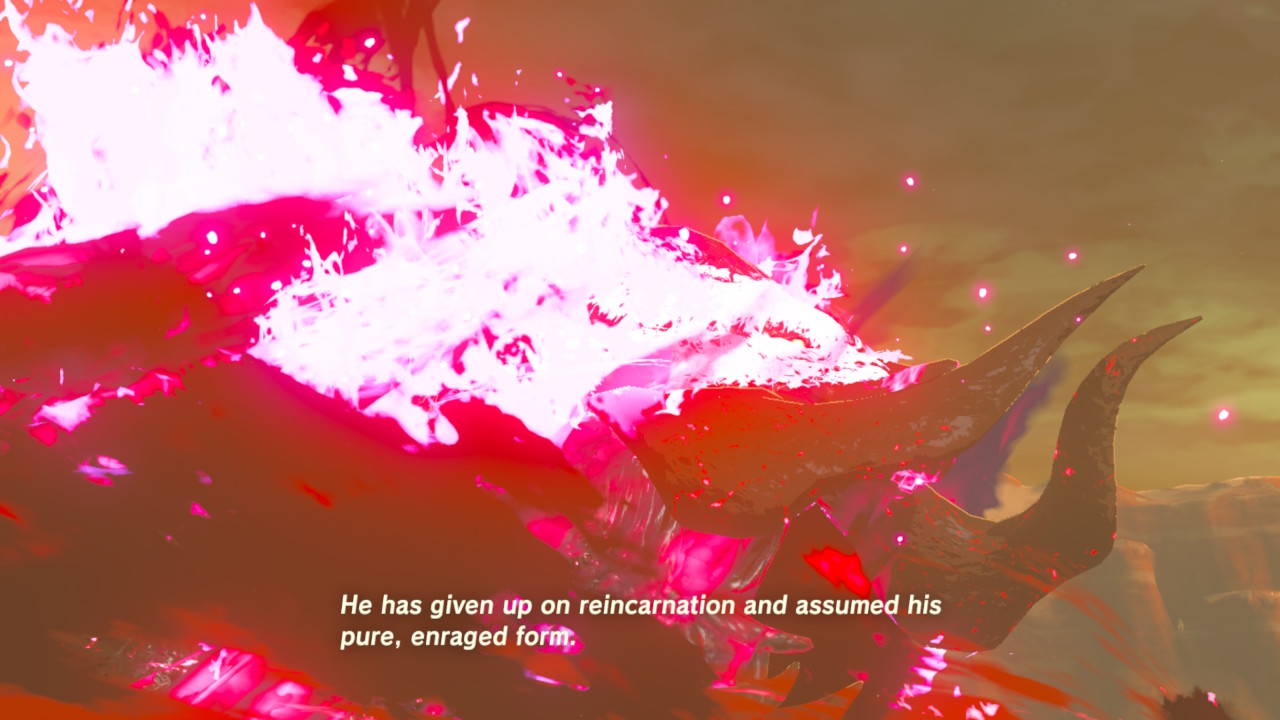 |
| North American English release (Switch) |
And here’s that same line with some of its surrounding text:
| Japanese Version (basic translation) | English Version |
| He’s an embodiment of hatred and grudge that arose in distant antiquity and revives again and again no matter how many times he’s destroyed. | Ganon was born out of a dark past. He is a pure embodiment of the ancient evil that is reborn time and time again… |
| This form was born from his obsessive refusal to give up on revival… | He has given up on reincarnation and assumed his pure, enraged form. |
| If set free upon the world, it would result in a tragedy surpassing the one 100 years ago. | If set free upon our world, the destruction will be unlike anything ever seen before. |
Basically,in Japanese, Ganon has a conviction/obsession that centers on reviving again, no matter what. He refuses to give up on it, and that strong conviction has transformed him into his beast form. However I look at the Japanese text, that’s what I keep going back to.
The official English translation seems to indicate the opposite, though. According to the English version, Ganon has unquestionably given up on getting restored and has intentionally transformed himself into his beast form.
I’ve only played the Japanese version in full so far, so it’s possible I’m missing other information that might’ve been explained in the English release. But at the very least it seems to me that the two lines do suggest very different things. I can’t really say much about the implications these differences have on Ganon’s details and lore, so I’ll leave that for other fans. Still, the English scene seems to imply that defeating Ganon now will destroy him forever, while the Japanese scene suggests that he’ll simply be back someday.
After giving it some thought, though, I realized there’s an alternate implication in the Japanese version: if his final form is the result of his refusal to ever give up, then maybe defeating that heightened form/refusal allows him to finally be gone for good. In which case both of the battles – between English Ganon and Japanese Ganon – would still have the same end result. Given past Zelda games, the “he’ll be back someday” interpretation seems most likely, however.
After the Battle
On a side note, English Zelda suddenly says that “Ganon is gone for now” during the ending, which, at face value, seems to contradict what she says during the final battle. Her wording now suggests he will still reincarnate after all.
 |
| North American English release (Switch) |
For the curious, the Japanese version says that “the threat of calamity has passed”.
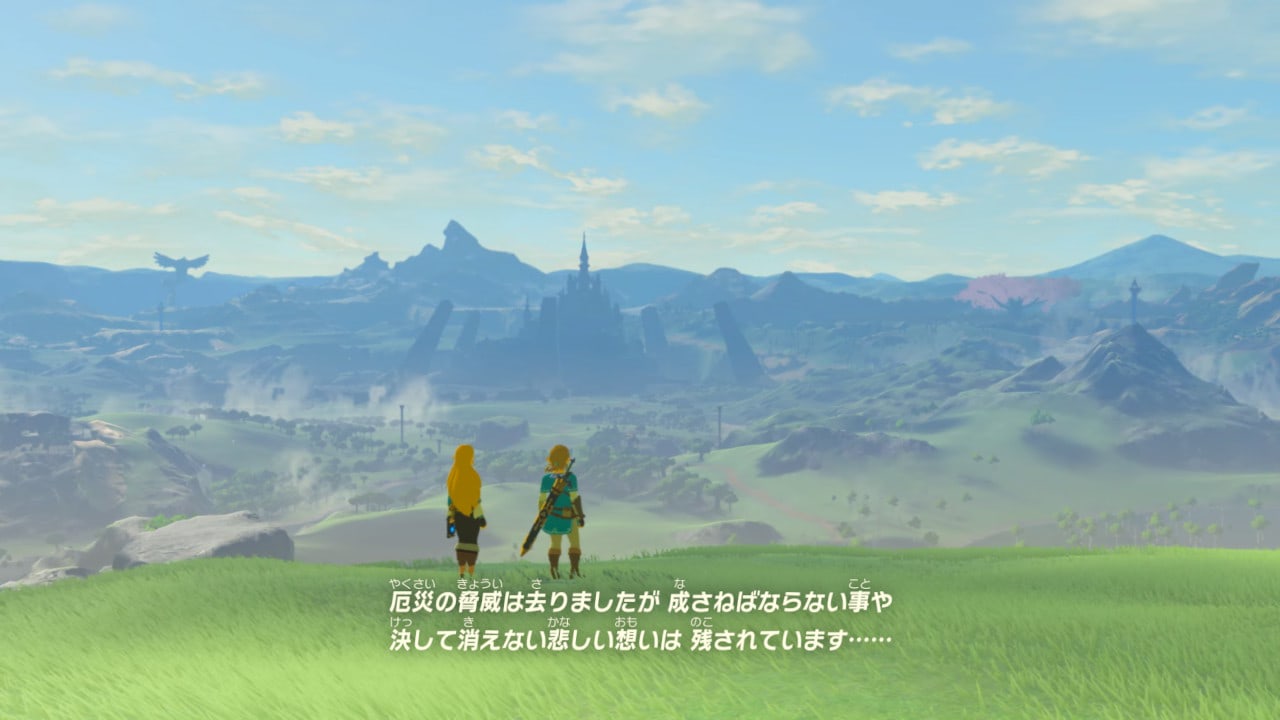 |
| Japanese release (Switch) |
Anyway, like I mentioned, I’m only familiar with the Japanese half of the game at the moment, so if I’m overlooking something or misinterpreting something please let me know in the comments or on Twitter.
It’s also very possible the English script was written in tandem with or maybe even before the Japanese script, which happens on occasion with big-budget, simultaneous worldwide releases. I didn’t follow the game’s development at all, so I’m not sure what the process was this time.
Note: There’s been some interesting discussion in the comments that goes into further depth, so check them out too!
If you liked this, check out my book dedicated to the very first Zelda translation and how it has affected every Zelda game since. You can also find many more of my online Zelda articles here!



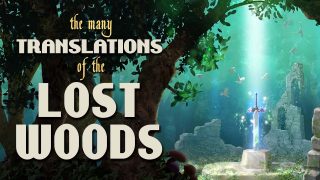
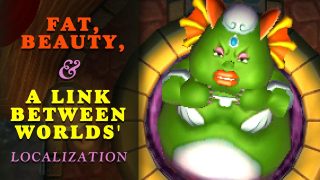
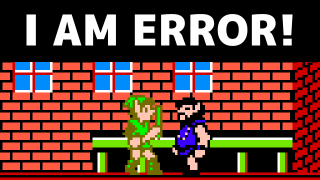
Oh, two other things I should note:
1. Although I used the word “born” in my basic translation, the Japanese phrasing in this context also has an “in out-of-control way” vibe.
2. I haven’t finished the DLC but here are my current Japanese screenshot stats :O
Perhaps the English script is saying that Ganon has given up on this reincarnation, since I don’t think neither Link nor Ganon have the ability to just stop being reborn
Maybe it’s supposed to mean that he’s just a beast now. The Gerudo Ganondorf is dead. All that’s left is this savage beast.
Even without that dialogue, anyone who has played the other Zelda games and then played this one can see that Ganon is more of a monster than he’s ever been. He’s like a force of nature, and his first form (a creepy spider monster) looks like it’s falling apart.
Sure, I agree and I don’t think that’s in dispute really – he’s clearly just a beast now in both versions. joeymartin64’s question was more focused on the “how” he became a beast and how that reason appears to be technically different in both versions. Either way, I think it’s all a nice little departure from most of the other Ganons in the series so far.
I disagree with your translation. You even said it was basic. You can misinterpret what they are trying to say. I am sorry but I don’t agree with your translations at all.
Um, do you speak Japanese?
If you can supply a better translation or add more context to it or even more context to the English version that clarifies the differences, I’m sure Mr. Mandelin would like that. He’s never been unreasonable about that kind of thing.
But otherwise what we have is the best information we have available and what you’re stating just seems to be insulting for no real reason or anything to back it up.
Huh, it’s interesting seeing the changes in subtext caused by this localization difference; while the Japanese line makes him seem extremely persistent, the English one gave me the impression that he was tired of waiting to be fully revived and just decided to attack Link then and there.
As for the change to Zelda’s line in the ending, the English version seems a bit too sequel hook-y in my opinion, considering the implications throughout the game that this would be Link’s final battle with Ganon in whatever timeline this took place in, assuming the timeline is being taken into account here at all.
I hated learning that this line is inaccurate. I love the idea that Ganon has completely given up on his meticulous planning because it contrasts so perfectly with Link’s entire journey in this game, which is literally all optional preparation for the final fight. It really makes Ganon a foil to Link in a more profound way than usual. But I guess that was never the intention.
Accidental literature is a thing. Rejoice that chaos and chance (and mistranslation) have produced a better text =)
That’s actually a good point. Typically the games revolve around Ganon going around and building dungeons putting macguffins in all of them to keep you away from them, and then doing all kinds of sleight of hand to hide his intentions and all this other stuff, and Link just kind of.. going in and undoing it.
And here almost everything you encounter is made by the good guys (even if some are temporarily repurposed by evil forces) to tutor you on the final battle and Ganon is basically just a force of nature that occasionally reincarnates bad guys and the Guardian machines, and otherwise is just floating around being angry. There’s pretty much no dungeons aside from the trials because Ganon is just a ball of anger and isn’t making any kind of grand scheme.
I never liked this too much while playing, but hearing it said like this does make the contrast a bit more palatable.
I had this idea that in Hylian, the word ‘Ganon’ simply means adversary, not necessarily linked to the Gerudo Ganondorf and suggested to be the residual malice left behind by Demise. The idea here is that Ganon (the entity) bonded with Ganondorf in someway and gave him power. At the end of OoT, Ganondorf allowed Ganon to fully take over, transforming him into that boar monster in the process. He was defeated of course in the end and was banished to who knows where in that timeline. In the Twilight Princess timeline, Ganondorf once again attempts to use Ganon against link but this time apparently has enough sense of self to basically get rid of Ganon from his body for whatever reason in order to properly fight link as himself. This marked the end of Ganondorf for good. As for what happened to Ganon after that, it’s quite possible that he eventually manifested as the Calamity one hundred years before the events of Breath of the Wild. This is all just a theory of course but at least it’s plausible.
So the “for now” WASN’T in the Japanese version! Interesting!
Skimming some other responses has me thinking about it in another way now: The Hyrule Compendium states the Calamity Ganon boss we see is a not-yet-finished physical body:
“Hibernating within a cocoon, it attempted to regenerate a physical form after Link awoke but was forced to confront him in an incomplete state.”
It’s playing fast and loose with words like “revival” and “reincarnation” and even “regeneration”, but perhaps the English line could mean that he’s only given up on THAT SPECIFIC body/reincarnation/regeneration/ect., rather than the whole concept in general.
That would actually harmonize it somewhat with the Japanese line; since Link has prevented the physical body we see from being completed, his desire to revive going out of control as a result of that could then be interpreted in a “you done pissed him off” kind of way.
No idea what the Japanese version of the Hyrule Compendium says, though.
I always read the line this way, in relation to the the failed reincarnation that was Calamity Ganon, the previous fight. I think this context would be lost on those who did not take a Compendium entry, but like a lot of the plot, it’s hidden away in diaries and the Compendium, so this isn’t unusual.
So while the line could be misread and the Japanese version is more clear that this is yet another attempt at revivial (via pure anger and malice), I don’t think it’s necessarily incorrect as he has, for now, given up on the previous attempt at a true reincarnation (presumably as something more human in appearance).
Oh man, I’m such a terrible photographer, I didn’t even think to photograph him in either form, haha
With that info in mind, your interpretation of the English version sounds spot-on. It leaves both with the same end result even with the difference of English Ganon giving up this regeneration and Japanese Ganon not giving up this regeneration and/or regeneration in general.
Man, all this talk about regeneration and restoration and reviving and reincarnating is messing with my brain, like when you say a word a bunch until it loses meaning 😯
Here is the Compendium description of the Calamity Ganon in Japanese:
“古来 繰り返しハイラルに現れ闇をもたらす元凶
時代により 大魔王や厄災とも呼ばれる
繭の中で 体が復活するのを待っていたが
リンクの目覚めに反応し 不完全な状態で
その姿を現した”
And the Dark Beast Ganon’s, just in case:
“リンクによって倒され 霧散した怨念が集合した姿
禍々しい魔力と 荒ぶる獣のようなその姿は
魔獣と呼ぶに相応しい
ガノン本来の姿とされ 意識は怨念に飲み込まれ
暴走している”
I might be wrong, but I read the “for now” as very lightly implied by the word choice “去る”, which for me states that the threat is “gone” but leaves open the possibility that it (or other threats) may still be out there somewhere to return another day. I think that the English line is an appropriate translation, though the needle perhaps could have been threaded in other ways (“We’ve averted calamity, but much work remains to be done” or something along those lines.)
(I also agree with Clyde that the English line about giving up on reincarnation does not reflect the intended meaning of the original Japanese, although I too only played the Japanese version.)
Oh, yeah, I didn’t mean to say that “for now” was wrong or different or anything, I only mentioned it because it seemed counter to what she had previously said in the final battle. I included the Japanese version of that same line just for anyone who was curious.
(Just a quick note that per a Twitter pal’s + fellow translator’s suggestion I added “the threat of calamity has passed” to the article, which I think is a clearer translation than what I originally had. (Thanks Vagabond!))
I just saw Clyde’s latest reply. I think that if the English was meant to mean “this reincarnation” they should have written “this reincarnation” and not just “reincarnation”, and even then I have trouble reconciling it with the Japanese. Plus, it has to be read in context with the previous line, which states he’s an embodiment of malice that revives again and again no matter how many times he is destroyed, which is only reinforced by the text in question “復活を諦めない妄念”
I meant to include this in joeymartin’s chain. I’m not very good at posting today!!
One more for now.
Also, look at the following line, which the previous two are leading up to: “If set free upon the world, it would result in a tragedy surpassing the one 100 years ago.”
Why would setting Ganon free now result in a worse disaster than the near total destruction of the world 100 years earlier? Because not only is he an embodiment of hate and malice, his refusal to abandon reincarnation has transformed him into this wild beast.
Indeed, these are all things that made me wonder if maybe the English text had been written first or if it had been based on a pre-final Japanese script. A Twitter commenter mentioned that the French translation matches the Japanese version, which is interesting.
It feels like a mistranslation, but I’m a bit perplexed as to how the interpretation came about. Do you think it could it be the use of “kara”? 妄念から暴走した姿. Like he recklessly ran away from / abandoned his obsession?
It’s certainly possible, but somehow the whole thing (with what else I’ve seen of the English version) strikes me more as an alternate version – whether an intentional rewrite, a translation that was over-polished by an editor, or a translation based on a pre-final script. I’m reluctant to conjecture much more since I’ve only seen a tiny part of the English game though.
It’s unfortunate yet intriguing that overlooking a single word can reverse the entire meaning of a line of dialogue in translation – and in this case, part of the story. I remember there being a few examples of this that you had in your EarthBound comparison. But unlike that game, it seems BotW gave LESS localization attention to the more “important” lines, probably because most of them were voiced and presumably had a deadline. Which is understandable, but can have devastating side effects as shown here.
Oh wow, I was doing some comparisons on the game too (though mostly silly side dialogue), so had no idea they said that about Ganon in English. But that’s okay, you looked into it and did a far better job than I ever could! It once again shows the importance of all the small things that go into translation, and what big differences they can make.
Haha, no way, I feel I barely touched the surface with this scene so feel free to have at it! I’d also be curious to read about what kind of implications this info has for Zelda lore and all that good stuff 😛
Thinking on it, it does make sense that the implication was that Ganon had given up on that specific reincarnation to assume his dark beast form. The problem in this case is that the wording is vague enough that it could be interpreted as “given up on all forms of reincarnation”. A simple “this” injected after “He has given up on” and before “reincarnation” would have clarified that significantly.
hiw is it in other languages? are they based on the eng translations or are they translated sepparated?
The German version translates it to:
“Born eons ago… destroyed countless times… revived countless times…”
“Wrath and hatred incarnate.”
“His desire to return makes him furious…”
“If he succeeds, the tragedy from 100 years ago will seem harmless in comparison”
The Latin American version translates it to something like this:
“He was born in the darkness of the distant past and represents the embodiment of evil and hate. He has been reincarnated time and time again since immemorial times.”
“His wrath has culminated in this physical form.”
“If he gets free, the tragedy and destruction that will wreck Hyrule will be unthinkable.”
—
And the one from Spain translates it to:
“Ganon was born in a faraway time, and he represents evil and hate embodied.”
“Even if he’s defeated, he returns again and again.”
“He’s furious, because he cannot abandon his current form.”
“If we don’t stop him, the disaster will be worst than the one from 100 years ago.”
And here’s the Italian version:
“Born in a distant past, incarnation of hatred and grudge who comes back after every defeat.”
“Unable to leave this world, he’s now a conglomerate of pure fierceness.”
“If we don’t stop him now, the tragedy will be even more baleful than the one from 100 years ago
BOTW Ganon had no story or development. He was just an inert swirling pink and purple angy doom cloud. I think his fate is cruel. Does he always have the triforce of power or is the skyward sword “curse” the reason for his constant reincarnation? Does it even matter?
It’s perhaps worth noting that the official Legend of Zelda series chronology trifurcates at Ocarina of Time; Breath of the Wild is clearly set on the “hero is victorious” timeline, which also notably includes Wind Waker. It’s possible that this was intended to be a final ending to Ganon in that particular timeline; since Ganon has already met his final demise in both other timelines, it was a bit of an oddball to have that one open.
And, of course, it has zero impact on future games, since they’re inserted at all kinds of crazy places in the series chronology anyhow. 🙂
Just for my clarification, TP is referenced in a flashback. TP and WW are not part of the same (hero is victorious) splintered timeline. Rito exist due to ganon killing the zora. The survivors evolved into rito or something like that. This game has both rito and zora co-existing. It’s a nitpick, but crapping on the lore really ruined the experience. I didn’t know this world anymore. The history meant nothing since it was impossible.
I did enjoy parts of the game (enemy/temple/shrine variety needed some work; I loved the naked island and the mazes). I also wasn’t a huge fan when I played TP tbe first time. It clearly wasn’t a predecessor to WW and I was that so damn badly. I like it now, but man, that was a kick in the teeth my innocent little face. Anyway, clearly Nintendo doesn’t give a crap about the timeline and I look forward to history regarding this game.
There’s no reason why the Zora need to go extinct for the Rito to exist. Evolution doesn’t require that an older species go extinct in order for a new one to be created.
Is it obvious? Most readings have great difficulty placing Breath of the Wild in any timeline, because it includes references to and elements from all three.
My interpretation of this is that Ganon has given up on having his “physical” form returned. That Ganon has wholly and fully given himself over to his hatred, without any hope of regaining his human/gerudo form. I believe that Ganon allows himself to become the full creature rather than the man that he was. That is the way it played to me as I heard it. That Ganon gave up on being rborn as himself anymore. And that has nothing to do with whether he is ultimately defeated. I don’t think that he can be, especially since he has become a creature of total evil and hatred.
I think the issue is a difference between “revive” and “reincarnate” in this context.
Ganon doesn’t reincarnate, Link and Zelda do, as different people. But Ganon revives, always the same person.
Beast Ganon is so no longer himself, however, that the person and incarnation is far long gone by that point. I think that’s what they meant to say.
So I guess the end means to say that Ganondorf as a person is finally dead, but Ganon as a concept and spirit may still come back the same manner Link and Zelda do. (Which doesn’t need to happen as BotW is far in the future of it’s timeline)
It looks to me like the placement of から (because/by) after 諦めない (to not abandon) pretty clearly indicates that what happens is due to Ganon not giving up his desires.
I suppose I might render it as something like: “Resurrected by sinful desires it refused to abandon, it rampaged.”
BUT. When I first looked at it, I glossed over the から somehow, and just took ら as pluralizing 妄念. And if you do that, you lose the causality connection…
But even then, the -ない is pretty clearly negating the verb for abandoning…
I think “脅威は去った” implies “the threat of calamity is gone/has passed for now”.
“脅威は永遠に去った” is a bit of odd.
“脅威は永遠に無くなった” is OK.
“去った” makes me imagine that something opened the door and got out, or walked/flied away and faded out.
It couldn’t die nor go other universe. It exists somewhere in this planet.
I agree, 去った leaves the door open for the calamity to come back at anytime, anywhere. I only included that Japanese screenshot for curiosity’s sake – my focus was on showing how the English screenshot potentially contradicted with the English final battle.
I apologize that I broke this
article with my awkward
English.
There’s already posted the
comment about “for now”.
I overlooked it.
I feel same as you.
I’m curious about the
contradiction.
Since both versions have “for now”
expression,
I think that “He has given up
on reincarnation” is a simple mistake.
It’s very likely.
If the English version goes
different way, it’s exciting though.
Did I catch a mistake, or intentional English? In the hovertext for the first image:
“This just barely game manages…” instead of “This game just barely manages…”
The french version seems to adapt the text in another way:
Ganon. Depuis l’aube des temps, notre éternel ennemi…
(Ganon. Since the dawn of time, our eternal enemy…)
Il est la flamme du mal et de la haine
(He is the flame of evil and hatred)
Maintes fois étouffée, toujours ravivée
(Many time extinguished, always revived)
Son incapacité à retrouver sa forme charnelle ne fait qu’attiser sa fureur destructrice
(Being unable to have a physical body again only makes his destructive rage arises)
S’il se libérait, une tragédie sans précédent s’abattrait sur Hyrule.
(If he frees himself, an unprecedented tragedy will fall on Hyrule).
First sorry for my approximative translation as the french version as a double meaning and especially a strong theme about fire.
I’m a little bit lost as it seems until now the only translation saying that it is the fact he can’t have a body that makes him this enraged form as the english version says it is the fact “He has given up on reincarnation and assumed his pure, enraged form” and the japanese version “This form was born from his obsessive refusal to give up on revival…” Even if it implies the fact that he absolutly wants a body and it frustrate him to the point he assumes the enraged form which is quite similar to what the japanese version says.
For the “Ganon is gone for now” in french she says: “la menace de Ganon est levée” very close to the japanese “the threat of calamity is gone/has passed”.
So, in the Wind Waker, the word “Triforce” has mutated into “Triumph Forks” over the weird game of Telephone that language sometimes plays. What about in Japanese?